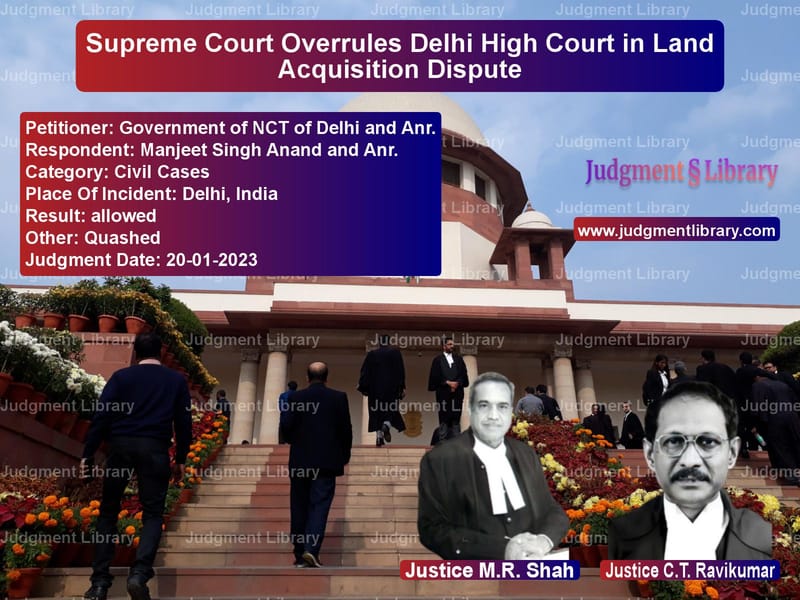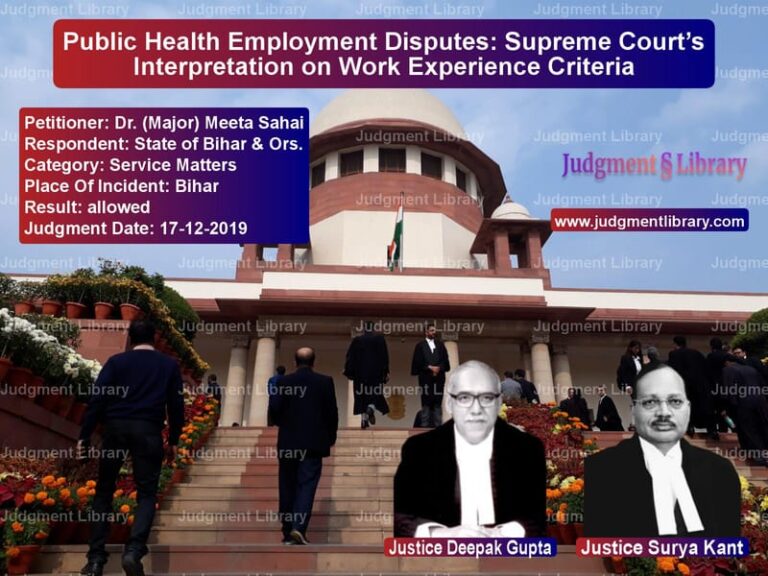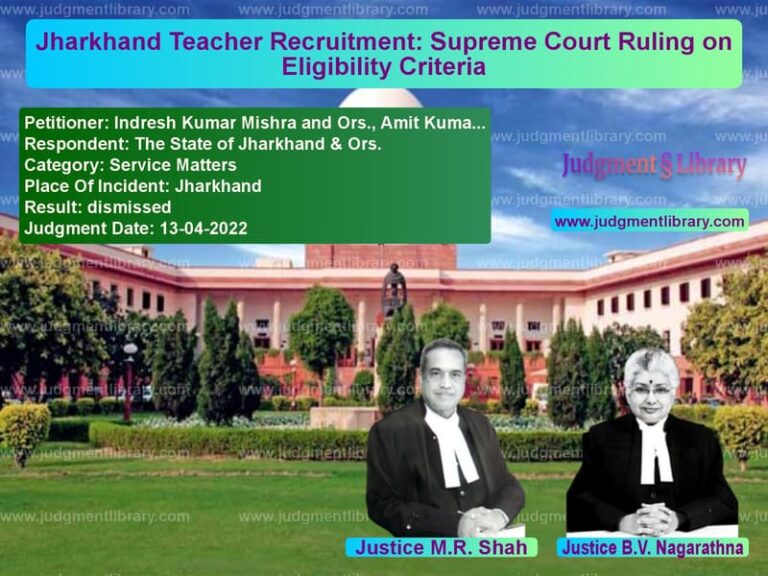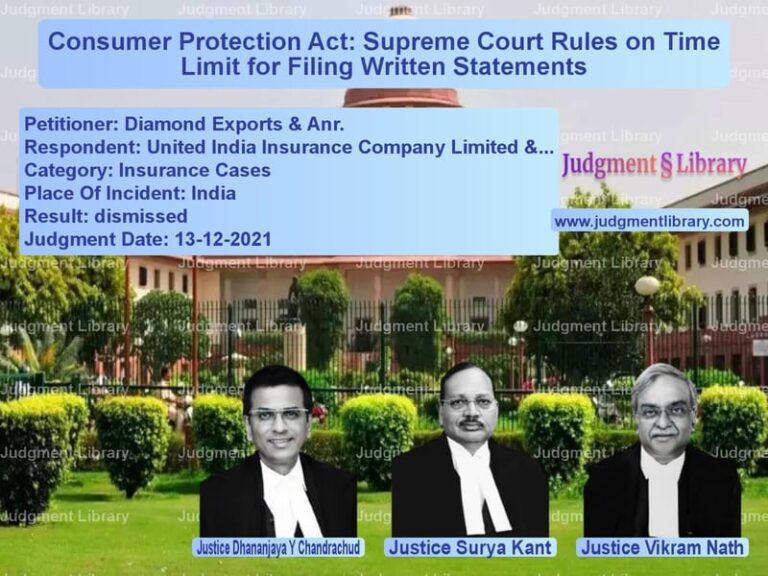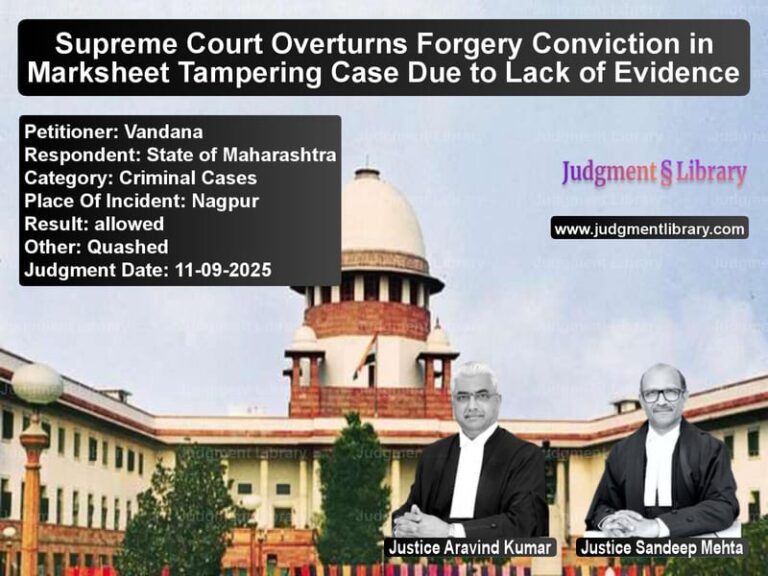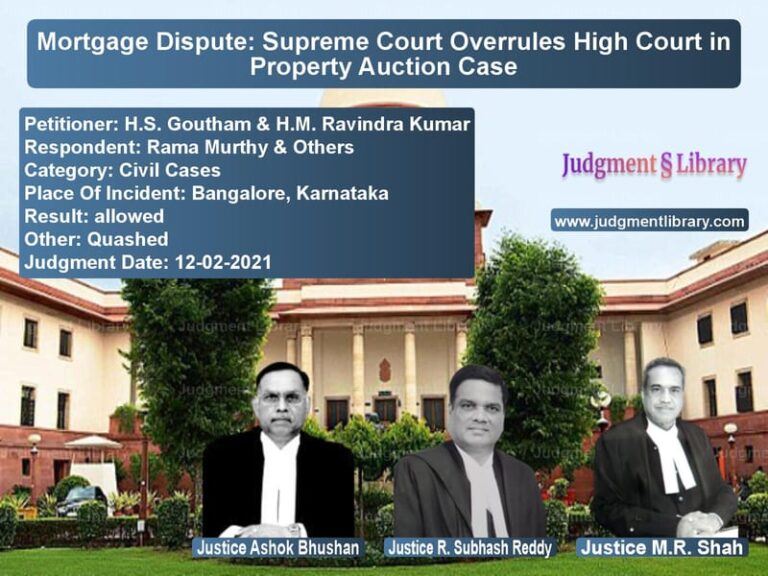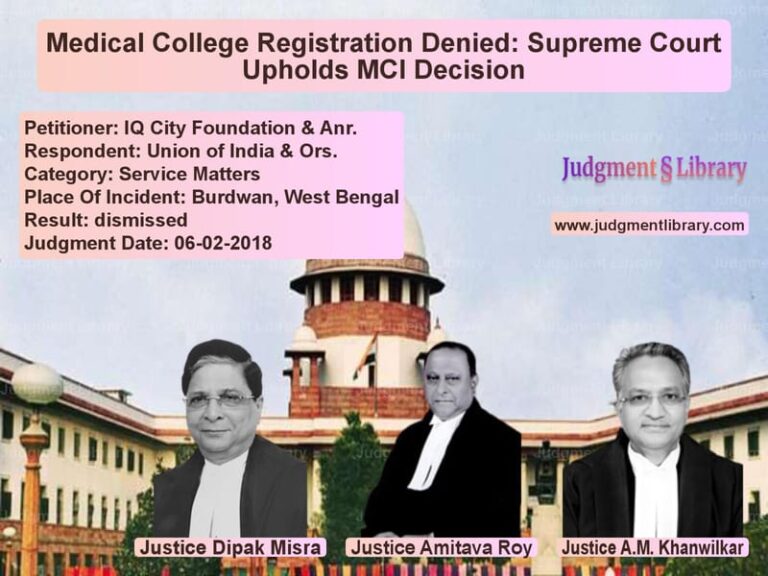Supreme Court Overrules Delhi High Court in Land Acquisition Dispute
The case of Government of NCT of Delhi and Anr. v. Manjeet Singh Anand and Anr. concerns the legal question of whether a land acquisition proceeding initiated under the Land Acquisition Act, 1894 can be deemed to have lapsed under Section 24(2) of the Right to Fair Compensation and Transparency in Land Acquisition, Rehabilitation and Resettlement Act, 2013. The Supreme Court ruled that the High Court erred in its interpretation and set aside the order declaring the acquisition as lapsed.
Background of the Case
The land in question was acquired in 1964 under a notification issued on February 13, 1964. The award for compensation was passed on May 12, 1967. According to the Land Acquisition Collector (LAC), the physical possession of the land was taken on June 7, 1967, and the compensation amount was duly deposited in the Reference Court on November 13, 1967.
Decades later, after the enactment of the Land Acquisition, Rehabilitation and Resettlement Act, 2013, the original writ petitioner, Manjeet Singh Anand, filed a petition before the Delhi High Court, claiming that the acquisition had lapsed under Section 24(2) of the 2013 Act. He relied on a General Power of Attorney and certain receipts to assert his claim over the land.
Read also: https://judgmentlibrary.com/supreme-court-directs-ongc-to-complete-land-acquisition-in-ahmedabad/
The High Court allowed the petition, relying on its previous ruling in Smt. Harbans Kaur v. Govt. of NCT of Delhi and Ors., which was based on the Supreme Court’s earlier decision in Pune Municipal Corporation v. Harakchand Misirimal Solanki. The Delhi Government challenged the decision in the Supreme Court.
Key Legal Issues
1. Can a Land Acquisition Proceeding Lapse Under Section 24(2) of the 2013 Act?
The primary issue was whether the acquisition proceedings initiated in 1964 could be deemed to have lapsed due to the provisions of Section 24(2) of the 2013 Act.
The Supreme Court observed:
“The deemed lapse of land acquisition proceedings under Section 24(2) of the 2013 Act takes place where, due to inaction of authorities for five years or more prior to the commencement of the Act, the possession of land has not been taken nor compensation has been paid.”
The Court clarified that since the possession had been taken in 1967 and compensation was deposited, the acquisition could not be deemed lapsed.
2. Impact of the Indore Development Authority Case
The High Court had relied on the Supreme Court’s ruling in Pune Municipal Corporation, which had held that non-payment of compensation resulted in the lapse of acquisition.
However, the Supreme Court noted that this ruling was overruled by the Constitution Bench in Indore Development Authority v. Manoharlal. The Constitution Bench held:
“The word ‘or’ used in Section 24(2) between possession and compensation has to be read as ‘nor’ or as ‘and’. If possession has been taken or compensation has been paid, then there is no lapse.”
3. Locus Standi of the Writ Petitioner
The Delhi Government argued that the petitioner, Manjeet Singh Anand, had no legal standing to challenge the acquisition, as he was not the original recorded owner. The Supreme Court agreed, citing its ruling in Shiv Kumar v. Union of India, which held that a subsequent purchaser has no right to question the acquisition.
Supreme Court’s Judgment
The Supreme Court ruled in favor of the Delhi Government, stating:
- The acquisition proceedings could not be deemed to have lapsed since possession was taken and compensation was deposited.
- The High Court erroneously relied on an overruled precedent.
- A subsequent purchaser has no right to challenge the land acquisition.
The Court set aside the High Court’s ruling and upheld the validity of the acquisition proceedings.
Implications of the Judgment
This ruling has significant implications for landowners and government acquisitions:
- Clarifies the Applicability of Section 24(2): The judgment reinforces that an acquisition cannot lapse if either possession is taken or compensation is deposited.
- Prevents Misuse of Land Laws: The ruling ensures that landowners cannot misuse Section 24(2) to challenge decades-old acquisitions.
- Limits the Rights of Subsequent Purchasers: The decision reiterates that only the original landowners have the right to challenge acquisitions.
Conclusion
The Supreme Court’s decision in Government of NCT of Delhi v. Manjeet Singh Anand provides much-needed clarity on the scope of Section 24(2) of the 2013 Act. It reaffirms that once possession has been taken or compensation has been deposited, an acquisition cannot be deemed to have lapsed. This ruling strengthens the government’s ability to retain acquired land for development purposes and prevents undue litigation by subsequent purchasers.
Read also: https://judgmentlibrary.com/supreme-court-rules-on-land-acquisition-dda-vs-shakuntla-devi-case/
Petitioner Name: Government of NCT of Delhi and Anr..Respondent Name: Manjeet Singh Anand and Anr..Judgment By: Justice M.R. Shah, Justice C.T. Ravikumar.Place Of Incident: Delhi, India.Judgment Date: 20-01-2023.
Don’t miss out on the full details! Download the complete judgment in PDF format below and gain valuable insights instantly!
Download Judgment: government-of-nct-of-vs-manjeet-singh-anand-supreme-court-of-india-judgment-dated-20-01-2023.pdf
Directly Download Judgment: Directly download this Judgment
See all petitions in Property Disputes
See all petitions in Landlord-Tenant Disputes
See all petitions in Damages and Compensation
See all petitions in Contract Disputes
See all petitions in Judgment by Mukeshkumar Rasikbhai Shah
See all petitions in Judgment by C.T. Ravikumar
See all petitions in allowed
See all petitions in Quashed
See all petitions in supreme court of India judgments January 2023
See all petitions in 2023 judgments
See all posts in Civil Cases Category
See all allowed petitions in Civil Cases Category
See all Dismissed petitions in Civil Cases Category
See all partially allowed petitions in Civil Cases Category

